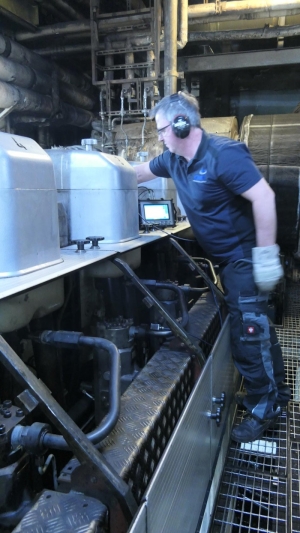


(Posted on 08/09/24)
Some of the world’s leading shipowners are trialling CM Technologies’ new cloud-based engine performance analysis tool as way of optimising the fleet wide efficiency of their marine diesel engines to meet CO2 reduction goals in line with the International Maritime Organizations’ EEXI and CII requirements.
The decision by major containership, tanker and bulk carrier operators in Europe, the United States of America, and Singapore is to upload data recorded from CMT’s PREMET diesel performance indicators to its new PREMET Cloud evaluation platform. The decision follows the efficiency improvement gains achieved by a number of Germany-based ship operators.
Both USC Barnkrug and BAT Agrar GmbH & Co. KG found that CMT’s analysis of engine cylinder pressures helped engineers and superintendents improve engine performance by between three and five per cent.
Matthias Winkler, CMT’s founder and CEO, said: “Essentially, PREMET Cloud provides the information required to ‘reset’ the prime mover back to its Factory Acceptance Test (FAT) condition to ensure complete fuel combustion. For those ship operators that are using the technology, this has resulted in significant improvements in fuel consumption, reduced CO2, NOx and SOx emissions, and lower deposits of soot.”
The combustion process – the chemical reaction inside two- and four-stroke diesel engines that turns fuel into energy – needs to completely burn the fuel for optimal engine efficiency. Analysis of cylinder pressures and other parameters can indicate incomplete combustion, which results in greater fuel consumption, emissions and component damage.
Michael Hinz, shipping manager, BAT Agrar GmbH & Co. KG, which has been monitoring and analysing the performance of main engines on four ships, said: “From CMT’s analysis we quickly discovered that the camshaft had shifted over 10 degrees. At first, we thought it was a mistake, but after adjusting the engine and the fuel pump to the right position the ship suddenly had 200kW more power. This first readjustment saved us a lot of fuel… and emissions.”
Reduced fuel and maintenance costs were also achieved for USC Barnkrug, which has rolled out the PREMET-X diesel indicator and PREMET Cloud combination across its fleet of 32 feeder ships.
The ship operator’s technical superintendent Heino Bröhan said: “We achieved a significant improvement in engine performance. The PREMET range combined with the Cloud platform helped us balance cylinder load, optimise injection timing and detect any worn or damaged engine components.”
The combustion process is a complex process and any slight deviation from the engine’s original design parameters can severely impede performance, resulting in unnecessary and costly increases in fuel consumption and emissions.
“By uploading data from PREMET diesel indicators to the PREMET Cloud, ship managers can easily assess and compare engine performance across their fleets and make the necessary adjustments. If you want to reduce shipping’s carbon footprint the best place to start is where carbon production starts: the combustion process itself,” Winkler furthered.
The PREMET Cloud platform, which can be integrated with other cloud-based ship performance tools, automatically analyses measurements from each piston cylinder against a set of 22 key parameters, such as RPM, fuel injection, compression and combustion pressures and angles, to provide alerts and recommended actions to optimise engine performance.
Cylinder performance information is generated immediately and can be accessed via the internet on any device anywhere in the word.
“The regular monitoring of a ship’s main engine is absolutely crucial not only in reducing operational costs and adhering to emissions abatement rules, but it also helps mitigate the risk of catastrophic engine failure,” said Winkler.
Rio Tinto’s first Pilbara-made iron ore rail car has rolled off the production line in Karratha... Read more
Precision meets progress at Phu My Port, Vietnam. The LPS 550 has been deployed to handle bulk commodities... Read more
bound4blue, a global leader in wind propulsion systems, has expanded its industrial footprint in Asia... Read more
As the industry explores multiple decarbonisation pathways, methanol is gaining attention as a practical... Read more
Technology group Wärtsilä will supply an integrated hybrid propulsion system for a bulk carrier... Read more
Superior Industries, Inc., a US-based manufacturer and global supplier of bulk material processing and... Read more
ESL Shipping has taken a significant step forward in digitalisation by deploying a new multichannel... Read more
Condition Monitoring Technologies (CMT) has deepened its presence across Asia’s most influential... Read more
After delivering its first full-scale seagoing project last week, Wattlab signed a contract at Europort... Read more
Steelpaint GmbH has reported strong growth in orders for corrosion protection coatings on Germany&rsquo... Read more